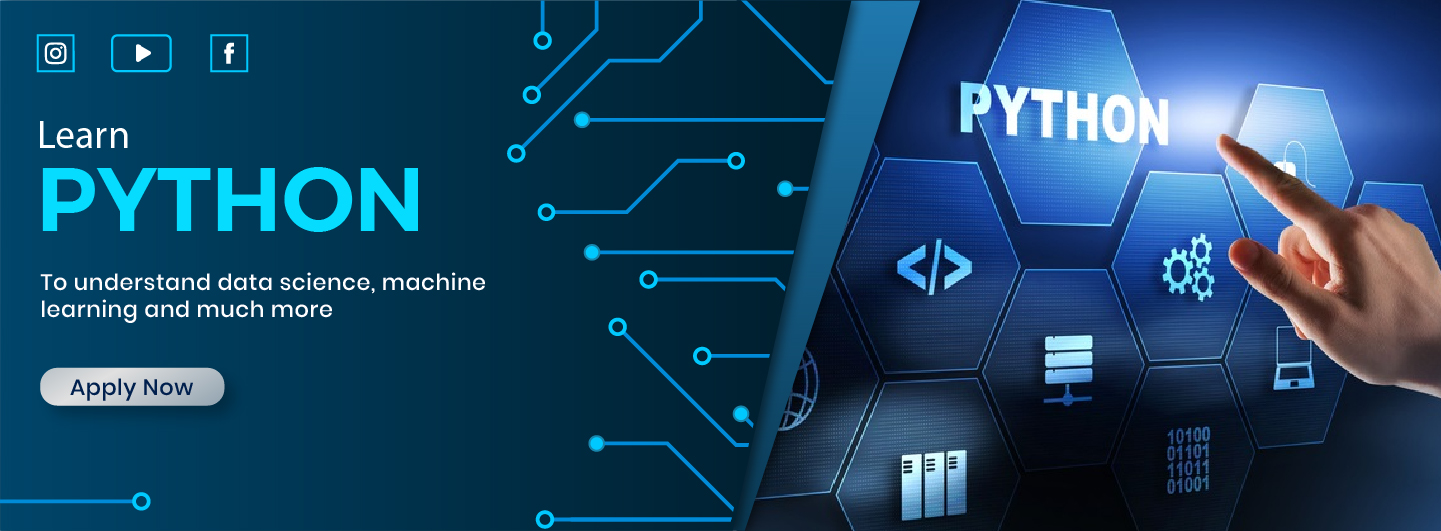


Python is a dynamic and flexible programming course designed to give advanced knowledge of python including how to write programs, create algorithms, test, debug python code and the fundamentals of data structures. Apart from being an open-source programming language, it is also one of the most versatile programming languages which is used for web development, task automation, data analysis, and data visualization.
Course Highlights
1. |
Creating Tuple |
2. |
Representation of Strings |
3. |
Python Debugger |
4. |
Create data visualizations |
5. |
10+ Assignment |
6. |
5+ Live Projects |
7. |
15 Modules |
8. |
1 Year Free Backup Classes |
Learning Outcome
| • | Learn how to work with various data structures within python, including: representation of strings, indexing, and slicing. |
| • | You will be able to store multiple values in a list and loop through lists. |
| • | You can use Python to create arcade, adventure and puzzle games that you can deploy within a few hours. |
| • | You can work on python projects such as creating a simple python calculator, writing an interactive quiz and building an alarm clock. |
| • | You will be able to edit and run python programs using IDEs. |
Software and Apps that you will learn in this course




Course Content
Jobs You will Get After Completing Course
In the past few years, Python has experienced remarkable growth. Its popularity has risen by about 50% from last year and has become the most demanding programming language without showing any signs of slowing. Across a wide range of fields, there are numerous job opportunities for those having python skills because it reduces coding effort and result in better test perfromance ensuring better programming.
| Job profile After completing this course |
Average salary ( 1+ year experience) |
|---|---|
| Data Analyst | 35k- 45k |
| Financial Analyst | 30k- 40k |
| Data engineer | 25k- 35k |
| Python developer | 35k- 50k |
| Machine Learning Engineer | 45k- 65k |

Backup Class

Flexible Timing

Fees Installment

Expert Trainer

100% job assistance

Free Library
.webp)
Live Project
.webp)
Practical learning

Hello,
My name is sarita,I'm student of IFDA institute. IFDA is the best computer training institute. Overall I love all the classes I have taken through IFDA institute,all the instructiors are kind and petient.They are very experienced in the program they are teaching.I have recommended this site to my school and friends. IFDA provides both practical and theoretical classes. Had a great experience here.☺️

I consider it very helpful because when when I first got into IFDA institute, it was very friendly and my knowledge in technology has gotten just not better but best. All the faculty here are very polite and ready to help whenever asked. Getting in this institute was my best decision.

I have a great experience in IFDA. The trainers are very supportive and explain every topic in detail. This Institute also provide backup classes on Saturday. I would like to suggest to join IFDA Institute to my friends and relatives. Thank u

0k +

0k +

0+
.webp)
0+
Frequently Asked Questions
We provide internship and 100% job assistance to those students who are hard working and well-mannered till the course is completed. We conduct interviews with our recruiters for you to get hired that help you to gain professionalism in this field.
Students can pursue this course if they have completed class 10th from a recognised board or university and are eager to learn new and creative skills.
The benefits of using python are-
Python is different from other programming languages as in this language there is more functionality with less coding, simple syntax, python codes can easily be written as well as executed much faster and it is very easy to use in comparison to other programming languages.
IFDA has emerged as the most encouraging & favorable institute in Delhi which is an ISO certified computer training institute ,started in the year of 2014. We provide various Govt. and Non Govt. Courses to all the desired students.
Yes we provide weekly classes or you can schedule your class according to your suitable time. We also provide online and backup classes so you can attend your missed or pending lectures.
 (1).png)
 (1).png)
 (1).png)
 (1).png)
 (1).png)
 (1).png)
Get free counselling by our experience counsellors. We offer you free demo & trial classes to evaluate your eligibilty for the course.
Have you
Any question
Or need some help?
Please fill out the form below with your enquiry, and we will respond you as soon as possible.